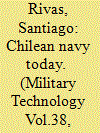| Srl | Item |
| 1 |
ID:
135591


|
|
|
|
|
| Summary/Abstract |
Since the beginning of new millennium, the Chilean navy realized their long delayed modenisation plans, becoming one of the most powerful naval force in Latin America
|
|
|
|
|
|
|
|
|
|
|
|
|
|
|
|
| 2 |
ID:
135749


|
|
|
|
|
| Summary/Abstract |
Chile’s authorities have struggled to contain regular protests and attacks by the Mapuche minority and anarchist groups. Gideon Long examines the history of the community’s conflict over land rights, and the resulting legal and security issues.
|
|
|
|
|
|
|
|
|
|
|
|
|
|
|
|
| 3 |
ID:
136537


|
|
|
|
|
| Summary/Abstract |
The ICJ's decision addresses facts and themes related to the question whether or not a maritime boundary extended to 200-nautical miles had been set between Chile and Peru. Thus, the ICJ decision is deeply interwoven with the history of the maritime zone of 200–nautical miles and its Latin American roots. The task of the Court was to ascertain whether a delimited boundary had been agreed, and if that had been the case, whether it has been established in connection with the long standing proclamations of an extended maritime zone of 200 nautical miles, first unilaterally and then multilaterally by the 1952 Santiago Declaration on the Maritime Zone and further agreements. The explicit reference to a delimitation line embedded in successive agreements was settled in favor of an implicit agreement enshrined in the terms of the 1954 Agreement of a Maritime Frontier Zone, preceded by a subtle crystallization of a delimitation process prior to it. The point was deduced from Article I of the 1954 Agreement which explicitly states that “A special zone is hereby established, at a distance of 12 nautical miles from the coast, extending to a breadth of 10 nautical miles on either side of the parallel which constitutes the maritime boundary between the two countries”.
|
|
|
|
|
|
|
|
|
|
|
|
|
|
|
|
| 4 |
ID:
134494


|
|
|
|
|
| Summary/Abstract |
This article assesses the possibilities for the development of foreign-policy role theory using the concepts of traditions and dilemmas from the interpretive approach to foreign policy, as well as narratives as an interpretive method for analysis. While role theory is rich in conceptualization, it still suffers from overt structuralism, inattention to domestic processes of divergence/convergence affecting national roles, and from methodological underdevelopment. This article goes beyond studies of national role conceptions that present foreign-policy behavior as determined by the national role, thus making it possible to understand the interplay of competing voices in determining a national role, the processes of role change, and the resulting reorientation of foreign policy. This article illustrates the possibilities and limitations of merging role theory and the interpretive approach through the study of Chile's and Mexico's attempts to join the Asia Pacific Economic Cooperation (APEC), their accession to APEC, and their performance once accepted into APEC.
|
|
|
|
|
|
|
|
|
|
|
|
|
|
|
|